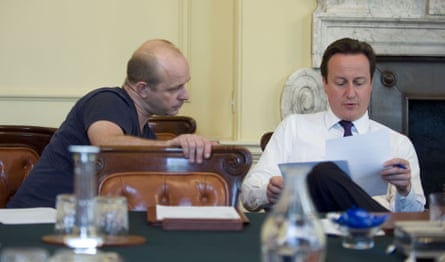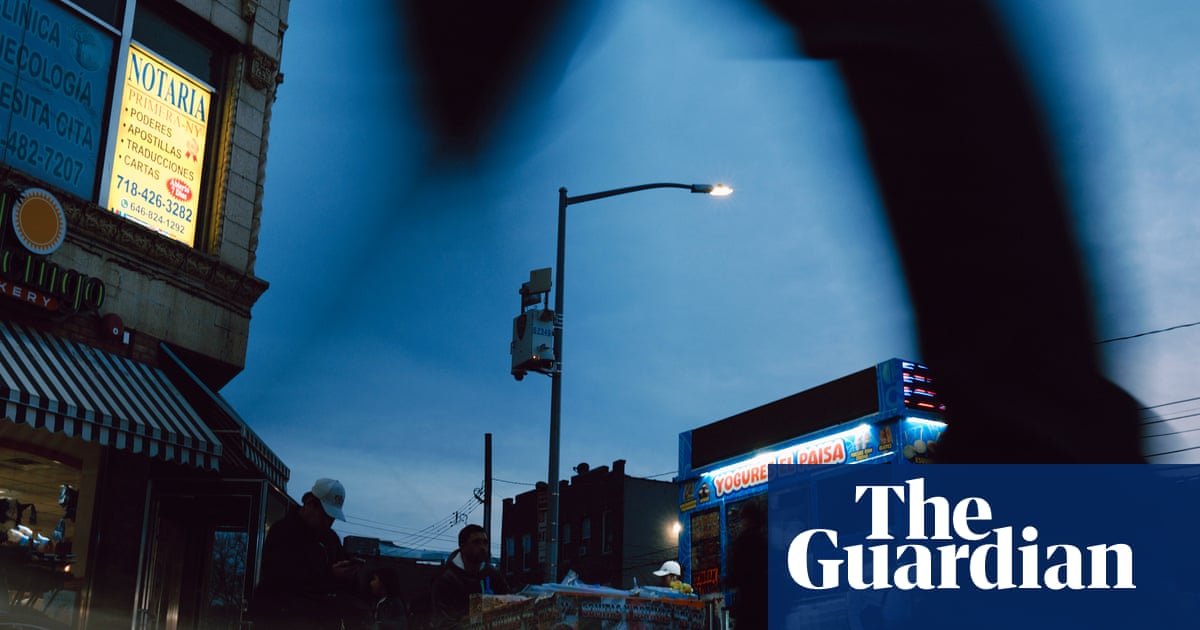California is usually regarded as a political graveyard for ambitious Republicans, but Steve Hilton, the smiling, bald-headed former British political consultant turned Fox News personality, has a few theories of how to turn that around.
Theory number one is that the Democrats, who have not lost a statewide election in almost 20 years and enjoy a supermajority in the California legislature, make the argument for change more or less by themselves, because the state has become too expensive for many of its residents and is mired in a steep budgetary crisis.
Even the current governor, Gavin Newsom, argues that his party’s brand has become toxic, that Democrats across the country have lost their way, and “people don’t think we make any damn sense”. The leading Democratic candidates to succeed him have been similarly blunt.
“Everything costs too much!” the former congresswoman Katie Porter says on her campaign website. “Homes and rent are too expensive,” the former state attorney general Xavier Becerra concurs on his. “Folks can barely cover their grocery bills. Healthcare costs are incredibly high.”
To which Hilton responds gleefully: “We know! You did it to us!”
Given the depth of the malaise – “Califailure”, the title of his campaign book calls it – Hilton believes that next year’s governor’s race offers Republicans a unique opportunity. If even Democrats think it’s time for change, he argues, wouldn’t it make sense for voters to look elsewhere for a solution?
And that leads him to theory number two: that an engaging, energetic, unorthodox-sounding candidate like himself might just be the man for a job.
In the four weeks since he announced his run for governor, Hilton and a skeleton staff have crisscrossed the state in a distinctive white pickup truck emblazoned with the Trump-like slogan “Make California Golden Again”. He has spoken at universities and presidential libraries, made common cause with hardcore Trump Republicans, and struck up conversations with voters in some of the most liberal corners of the state.
His style has been casual – he dresses most commonly in a T-shirt and sneakers as he sits down in coffee shops or addresses so-called “policy forums” for supporters – and he keeps a video crew close to post updates on social media and underline how little he looks or talks like a regular Republican candidate.
Back in Britain, where he was an adviser to the Conservative prime minister David Cameron from 2010 to 2012 and, later, a champion of Brexit, Hilton worked largely behind the scenes. He has been much more visible since as a Fox News host and contributor, and has honed a public persona that remains unabashedly rightwing but is also adept at presenting complex political viewpoints in easily relatable terms.
So far, at least, Hilton’s British origins have proven more of an asset than a liability. (“He just sounds smarter because of his accent,” the moderator at a Republican gathering in Santa Barbara said. “It’s almost not fair.”) Even his bare scalp has contrasted favorably in some quarters with Newsom’s famously coiffed full head of hair.
Hilton’s core message is simple: that Californians want good jobs, good homes and good schools for their kids. And the reason too many feel these goals are eluding them, he says, is because of “one-party rule and really bad ideas” from the Democrats.
That diagnosis certainly has the potential to resonate widely, particularly among working-class voters who, according to Hilton, are ‘being completely screwed” by high living costs, high taxes and a public school system whose test scores in English and math consistently lag behind the national average.
“It doesn’t have to be like this,” Hilton told the Santa Barbara crowd. “We don’t have to put up with this.”
The question, though, is whether Hilton is the alternative voters are craving– and that’s where observers believe he may be on shakier ground, particularly since his strongest political connections are with the Trump end of the Republican party.

Even Hilton’s more moderate ideas reflect a standard Republican playbook of cuts to taxes, public spending and business regulations – a platform Californians have rejected time and again. Dan Schnur, a former Republican campaign consultant who teaches political communications at Berkeley and the University of Southern California, thinks that behind the moderate facade Hilton is in fact “running pretty hard as a Maga candidate” on a range of issues from immigration to homelessness.
Hilton has a slightly different theory of the case. He sees parallels between California in 2025 and Britain in the late 1970s, when it was known as the “sick man of Europe”, and envisions himself as a version of Margaret Thatcher providing a much-needed rightward course correction. He drew laughter and applause in Santa Barbara when he complained about California’s “nanny state bossy bureaucracy” – a Thatcher-inspired turn of phrase – and when he borrowed from a celebrated 1979 Conservative campaign slogan to say “California isn’t working”.
Whether that message can work with independents and Democrats – constituencies he has to sway in large numbers to win – is far from clear. However much Hilton talks about “commonsense” solutions, his early champions include Charlie Kirk, who runs the Trump-supporting youth group Turning Point, and Vivek Ramaswamy, the tech entrepreneur turned politician who is old friends with Vice-President JD Vance and is now running for governor of Ohio – both of whom would suggest he has hitched his wagon to a more radical agenda.
Even when forging connections in working-class, heavily Latino East Los Angeles, Hilton has relied on a local Trump activist, now in charge of the White House faith office, who in turn introduced him to Maga-friendly grassroots groups with names like the Conservative Comadres and Lexit (for Latinos Exiting the Democratic Party).
The problem is not that Hilton’s new friends in East LA – many of them small business owners – do not reflect broader frustrations when they talk about working hard and having far too little to show for it. They almost certainly do.
The problem is that Trump’s brand of working-class populism is toxic in California – vastly more so than the Democrats – and growing only more so as Trump’s chaotic second term in the White House unfolds.
An LA Times opinion poll earlier this month showed 68% of Californians disapproved of the president’s job performance and thought the country was on the wrong track – numbers that many political analysts expect to worsen as the effects of Trump’s trade war kick in.
Hilton himself makes light of this problem, arguing that if he runs an energetic, attractive enough campaign it will cut across the political spectrum and create its own momentum. “We’ve just learned that California is the fourth biggest economy in the world, and that’s great,” he said in an interview, “but it isn’t an economy that works for the people who live here … We are building a movement and a coalition for change.”
Soon, though, he is likely to be pulled in different directions, because the logic of California’s primary system requires him to beat every other Republican before he can even think about the Democrats. And, in the age of Trump, there’s no competition between Republicans that does not require showing obeisance to the president. “The association’s going to be there, whether it results in a formal endorsement or not,” Schnur said. “Trump’s coat-tails are much longer in a primary than in a general election, which is good news for Hilton in the spring but a bigger obstacle in the fall.”
Hilton’s stiffest Republican competitor so far, the Riverside county sheriff, Todd Bianco, has already run into trouble with the Trump faithful because he took a knee in solidarity with Black Lives Matter protesters in the wake of the George Floyd killing in 2020. (Bianco, who generally talks and acts like a Trump-aligned Republican, insists he was tricked into kneeling when he thought he was being asked to pray – a version at variance with video footage from the time.)
At the Santa Barbara event, Hilton looked almost bashful when asked what Trump thought of his decision to run and gave only the vaguest of answers. It is unlikely to be the last time he will field such a question, though, or risk alienating some part of his target electorate with his response.
Hilton describes the task ahead as “possible, but difficult”. His chances most likely rest on another theory of his – that the rightward swing the country experienced last November was not a one-off, but a trend still gathering momentum. Hilton points to all the ways California was part of that national trend in 2024 – the 10 counties that flipped from blue to red, the rejection of liberal district attorneys and mayors up and down the state, the call for a stiffer approach to law and order in a key statewide ballot initiative – and concludes that “Californians voted Republican without realising it.”
The last time Trump was president, though, the midterm elections produced a major swing in the other direction, in California and across the country, and most political analysts expect the same thing next year. If office-holders can justifiably point the finger at Washington – for shortages on the shelves, or higher prices incurred by tariffs, or immigrant laborers vanishing from key industries – voters are likely to be more forgiving of their leaders’ own shortcomings.
“It would be much easier to make the case against the Democratic establishment if there weren’t a Republican president,” Schnur said. “An entire generation of Californians has come of voting age automatically dismissing the possibility of supporting a Republican candidate … That doesn’t mean a Republican can’t get elected governor, but it’s a very steep uphill fight.”

 German (DE)
German (DE)  English (US)
English (US)  Spanish (ES)
Spanish (ES)  French (FR)
French (FR)  Hindi (IN)
Hindi (IN)  Italian (IT)
Italian (IT)  Russian (RU)
Russian (RU)  2 weeks ago
2 weeks ago
























Comments